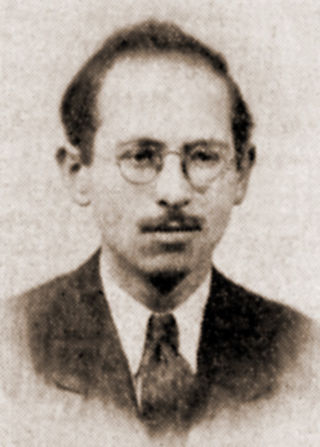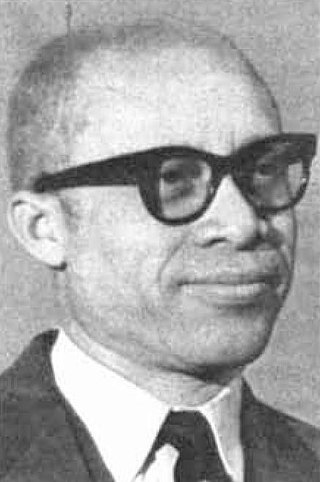Related Research Articles

Chicano or Chicana is an ethnic identity for Mexican Americans who have a non-Anglo self-image, embracing their Mexican Native ancestry. Chicano was originally a classist and racist slur used toward low-income Mexicans that was reclaimed in the 1940s among youth who belonged to the Pachuco and Pachuca subculture. In the 1960s, Chicano was widely reclaimed in the building of a movement toward political empowerment, ethnic solidarity, and pride in being of indigenous descent. Chicano developed its own meaning separate from Mexican American identity. Youth in barrios rejected cultural assimilation into whiteness and embraced their own identity and worldview as a form of empowerment and resistance. The community forged an independent political and cultural movement, sometimes working alongside the Black power movement.
The Revolutionary Socialist League (RSL) was a Trotskyist group in the United States established in 1973 and disbanded in 1989.

The Freedom Road Socialist Organization (FRSO) is a Marxist–Leninist organization in the United States. FRSO formed in 1985 amid the collapse of the Maoist-oriented New Communist movement that emerged in the 1970s. The FRSO's component groups believed that ultraleftism was the US New Communist movement's main error. Merging under the FRSO banner, these groups hoped to consolidate the movement's remnants in a single organization and move beyond the sectarianism that marked the previous decades.
The Communist League is or was a New Zealand communist party.
The New Communist movement (NCM) was a diverse left-wing political movement during the 1970s and 1980s. The NCM were a movement of the New Left that represented a diverse grouping of Marxist–Leninists and Maoists inspired by Cuban, Chinese, and Vietnamese revolutions. This movement emphasized opposition to racism and sexism, solidarity with oppressed peoples of the third-world, and the establishment of socialism by popular revolution. The movement, according to historian and NCM activist Max Elbaum, had an estimated 10,000 cadre members at its peak influence.

The Chicano Moratorium, formally known as the National Chicano Moratorium Committee Against The Vietnam War, was a movement of Chicano anti-war activists that built a broad-based coalition of Mexican-American groups to organize opposition to the Vietnam War. Led by activists from local colleges and members of the Brown Berets, a group with roots in the high school student movement that staged walkouts in 1968, the coalition peaked with a August 29, 1970 march in East Los Angeles that drew 30,000 demonstrators. The march was described by scholar Lorena Oropeza as "one of the largest assemblages of Mexican Americans ever." It was the largest anti-war action taken by any single ethnic group in the USA. It was second in size only to the massive U.S. immigration reform protests of 2006.
James Harris is an American communist politician and member of the National Committee of the Socialist Workers Party. He was the party's candidate for President of the United States in 1996, receiving 8,463 votes, and again in 2000, receiving 7,378 votes. Harris also served as an alternate candidate for Róger Calero in 2004 and 2008 in states where Calero could not qualify for the ballot due to being born in Nicaragua. More recently Harris was the SWP candidate in the 2009 Los Angeles mayoral election, receiving 2,057 votes (0.89%).
Evelyn Reed was an American communist and women's rights activist.

The Brown Berets is a pro-Chicano paramilitary organization that emerged during the Chicano Movement in the late 1960s. David Sanchez and Carlos Montes co-founded the group modeled after the Black Panther Party. The Brown Berets was part of the Third World Liberation Front. It worked for educational reform, farmworkers' rights, and against police brutality and the Vietnam War. It also sought to separate the American Southwest from the control of the United States government.
Harry Ring was an American communist and a founding member of the Socialist Workers Party.

George Breitman was an American communist political activist and newspaper editor. He is best remembered as a founding member of the Socialist Workers Party (SWP) and as a long-time editor of that organization's weekly paper, The Militant. Breitman also supervised and edited several important publishing projects as the head of the SWP's publishing house in the 1960s and 1970s.

Chicanismo emerged as the cultural consciousness behind the Chicano Movement. The central aspect of Chicanismo is the identification of Chicanos with their Indigenous American roots to create an affinity with the notion that they are native to the land rather than immigrants. Chicanismo brought a new sense of nationalism for Chicanos that extended the notion of family to all Chicano people. Barrios, or working-class neighborhoods, became the cultural hubs for the people. It created a symbolic connection to the ancestral ties of Mesoamerica and the Nahuatl language through the situating of Aztlán, the ancestral home of the Aztecs, in the southwestern United States. Chicanismo also rejected Americanization and assimilation as a form of cultural destruction of the Chicano people, fostering notions of Brown Pride. Xicanisma has been referred to as an extension of Chicanismo.

Clifton DeBerry was an American communist and two-time candidate for President of the United States of the Socialist Workers Party. He was the first black American in the 20th century to be chosen by a political party as its nominee for president.

The East Los Angeles Walkouts or Chicano Blowouts were a series of 1968 protests by Chicano students against unequal conditions in Los Angeles Unified School District high schools. The first walkout occurred on March 5, 1968. The students who organized and carried out the protests were primarily concerned with the quality of their education. This movement, which involved thousands of students in the Los Angeles area, was identified as "the first major mass protest against racism undertaken by Mexican-Americans in the history of the United States".
The League of Revolutionary Struggle (Marxist–Leninist) was a Marxist–Leninist[1] movement in the United States formed in 1978 by merging communist organizations. It was dissolved by the organization's leadership in 1990.
Las Adelitas de Aztlán was a short-lived Mexican American female civil rights organization that was created by Gloria Arellanes and Gracie and Hilda Reyes in 1970. Gloria Arellanes and Gracie and Hilda Reyes were all former members of the Brown Berets, another Mexican American Civil rights organization that had operated concurrently during the 1960s and 1970s in the California area. The founders left the Brown Berets due to enlarging gender discrepancies and disagreements that caused much alienation amongst their female members. The Las Adelitas De Aztlan advocated for Mexican-American Civil rights, better conditions for workers, protested police brutality and advocated for women's rights for the Latino community. The name of the organization was a tribute to Mexican female soldiers or soldaderas that fought during the Mexican Revolution of the early twentieth century.
The International Marxist Group (IMG) was a Trotskyist group in Britain between 1968 and 1982. It was the British Section of the Fourth International. It had around 1,000 members and supporters in the late 1970s. In 1980, it had 682 members; by 1982, when it changed its name to the Socialist League, membership had fallen to 534.
The Socialist Workers Party (SWP) is a Trotskyist party in the United States. Originally a group in the Communist Party USA that supported Leon Trotsky against Soviet leader Joseph Stalin, it places a priority on "solidarity work" to aid strikes and is strongly supportive of Cuba. The SWP publishes The Militant, a weekly newspaper that dates back to 1928. It also maintains Pathfinder Press.
John Riddell is a Canadian Marxist essayist, historian, editor, translator and activist. He is best known as editor of The Communist International in Lenin’s Time, an eight-volume series of books of Communist International documents, many of which have been translated into English for the first time.
References
- ↑ "Book Review: "The Politics of Chicano Liberation" Edited by Olga Rodriguez | Poor Magazine". www.poormagazine.org. Retrieved 2019-08-06.
- ↑ "The Militant - 3/18/96 -- Lessons From Chicano Liberation Struggle". www.themilitant.com. Retrieved 2019-08-06.